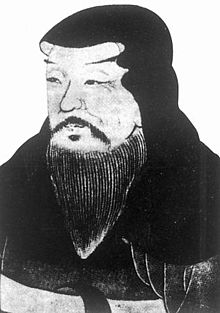Xu Shen
| Xu Shen | |
|---|---|
 |
|
| Native name | 许慎 |
| Born | 58 C.E. Henan, China |
| Died | 148 C.E. |
| Nationality | Chinese (Han Dynasty) |
| Other names | 叔重 Shūzhòng |
| Notable work | Shuowen Jiezi |
Xǔ Shèn (traditional Chinese: 許慎; simplified Chinese: 许慎; pinyin: Xǔ Shèn; Wade–Giles: Hsü Shen; IPA: [ɕy ʂən]; c. 58 – c. 148 CE) was a Chinese scholar-official and philologist of the Eastern Han Dynasty (25-189). He was born in the Zhaoling district of Run'an prefecture (today known as Luohe in Henan Province). During his own lifetime, Xu was recognized as a preeminent scholar of the Five Classics. He was the author of Shuowen Jiezi, which was the first comprehensive dictionary of Chinese characters, as well as the first to to organize entries by radical. This work continues to provide scholars with information on the development and historical usage of Chinese characters. Xu Shen completed his first draft in 100 CE but, waited until 121 CE before having his son present the work to the Emperor An of Han.
Xu was a student of the scholar-official Jia Kui 贾逵 (30-101). Under Jia, he established himself as a master in his own right and enjoyed a positive reputation. This education allowed him to hold several government offices at the prefecture leve, and ultimately rise to a post in the royal library. Before undertaking the Shuowen, he was already a prolific writer. Although lost, one of his better known early works was a commentary on the Huainanzi, an important sociopolitical work from the second century BCE.
Xu Shen's life and work were shaped by the fierce division between Old Text and New Text schools of Confucian thought. These rival camps grew out of the wide proliferation of Confucian texts, which was brought on by the Emperor Wu of Han's elevation Confucianism to the state philosophy. Because knowledge of the Confucian canon was the primary qualification for government office, there was a large upswing in the rate of copying. These new additions were written in a standardized Han dynasty script. During the reign of Emperor Cheng of Han (r. 33-7 BCE), however, older manuscripts were discovered in the imperial archives and in the walls of Confucius' family mansion. These older texts were written in a pre-Qin, small seal script (xiaozhuan 小篆). Importantly, they also differed in their content and organization. A group of scholars, which came to be called the Old Text school, emerged and advocated for the use of this more ancient version. The New Text school meanwhile preferred the more recent versions. Since Han jurisprudence was based on the classics, the interpretation of even a single character could lead to concrete differences in legal opinions. The great variation in interpretations greatly troubled Xu. He was familiar with both schools: Jia Kui was a respected Old Text scholar, but Xu's official work required familiarity with the New Text. In an attempt to eliminate discrepancies between interpretations, Xu authored Different Meanings of the Five Classics (五经异义), a commentary (now lost) that incorporated interpretations from both the New and Old Text schools. Xu picked the readings that were best to his mind, regardless of school. Ultimately though, Xu decided that only a rigorous work on the development and history of each character could standardize the interpretation of the classics.
...
Wikipedia
